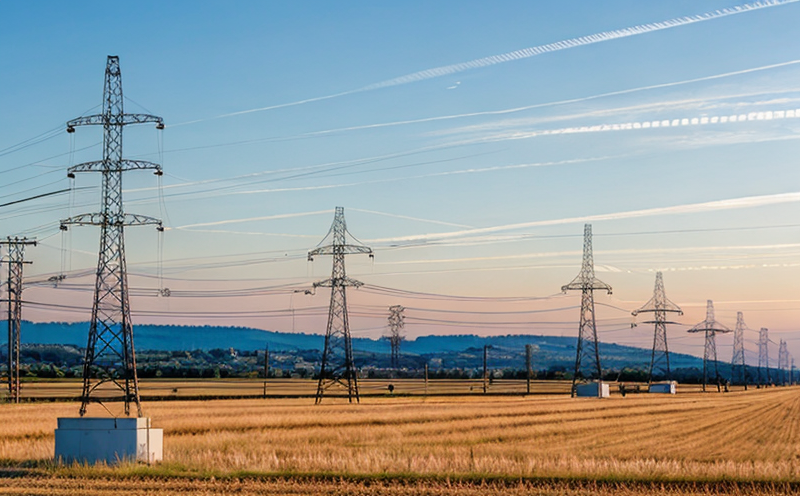IEEE 400 Field Testing of Power Cables
The IEEE Standard 400-2013 provides a comprehensive set of guidelines and procedures for field testing power cables, ensuring their safe and reliable operation in various environments. This service is critical for the Power & Utilities Testing sector, specifically targeting transmission and distribution systems. Compliance with this standard ensures that utilities meet stringent safety requirements while minimizing downtime and maintenance costs.
The IEEE 400 test encompasses a series of inspections, checks, and measurements to ensure that power cables are free from defects that could lead to failure under operational conditions. This service is particularly important for organizations responsible for the distribution and transmission networks, such as utility companies, electrical contractors, and maintenance teams.
During the field testing process, several key parameters are evaluated, including insulation resistance, sheath-to-conductor voltage withstand, temperature rise, and leakage current. These tests are conducted under real-world conditions to simulate operational stress scenarios. The service includes detailed documentation of all test results, ensuring that stakeholders have a clear understanding of the cable's condition.
The IEEE 400 field testing process is designed to be thorough yet efficient, providing actionable insights for maintenance and repair plans. This ensures that utilities can proactively address potential issues before they escalate into failures. The service also includes recommendations based on test results, helping clients make informed decisions about their cable management strategies.
One of the most significant benefits of this testing is its ability to extend the life cycle of power cables by identifying and addressing early signs of degradation. This proactive approach not only enhances safety but also reduces the financial burden associated with unplanned outages and replacements.
In summary, IEEE 400 field testing offers a robust framework for ensuring that power cables meet the highest standards of reliability and safety. By adhering to this standard, utilities can maintain their transmission and distribution systems efficiently and effectively, contributing to a more reliable electrical infrastructure.
Scope and Methodology
The scope of IEEE 400 field testing includes the evaluation of power cables under real-world conditions. This involves a series of tests designed to assess various critical parameters that can impact cable performance and safety. The methodology is aligned with international standards such as IEEE Standard 400-2013, ensuring consistency and accuracy.
- Insulation Resistance Testing: Measures the ability of the cable's insulation to withstand voltage stress without breakdown. This test helps identify any weak points in the insulation that could lead to failure.
- Sheath-to-Conductor Voltage Withstand Test: Assesses the integrity of the cable's sheathing by applying high voltage and monitoring for insulation breakdown or arcing.
- Temperature Rise Measurement: Evaluates how much the temperature of the cable increases under load conditions. This is crucial for ensuring that cables do not overheat, which could lead to failure.
- Leakage Current Monitoring: Detects any unwanted current flow through the cable's insulation, indicating potential defects or damage.
The testing process also includes visual inspections and dimensional checks to ensure that all components of the power cable meet the specified requirements. Additionally, the service provides detailed reports that summarize all test results and recommendations for maintenance actions.
The methodology is designed to be adaptable to various environmental conditions, ensuring that tests are conducted under realistic operating scenarios. This approach enhances the reliability and accuracy of the testing process, providing clients with actionable insights into their cable systems' condition.
Why Choose This Test
- Compliance with International Standards: Ensures adherence to IEEE Standard 400-2013, a widely recognized benchmark for power cable testing.
- Rigorous Testing Process: Comprehensive evaluation of critical parameters under real-world conditions, ensuring the highest standards of reliability and safety.
- Proactive Maintenance Planning: Identifies potential issues early, allowing for proactive maintenance and extending cable life cycle.
- Detailed Reporting: Provides clear documentation of test results and recommendations, facilitating informed decision-making.
- Enhanced Safety: Reduces the risk of electrical accidents by identifying defects that could lead to failure under operational conditions.
- Economic Benefits: Minimizes downtime and maintenance costs by addressing potential issues before they escalate into failures.
The IEEE 400 field testing service is an essential tool for utilities seeking to maintain their transmission and distribution systems efficiently. By choosing this test, clients gain access to a robust framework that ensures the highest standards of reliability and safety in their power cable operations.
Quality and Reliability Assurance
The IEEE 400 field testing service is designed to provide high-quality and reliable results by adhering strictly to international standards. This commitment to quality is further reinforced through rigorous calibration of test equipment, strict adherence to testing protocols, and thorough documentation of all procedures.
- Calibration: All test instruments are regularly calibrated using certified reference materials to ensure accuracy and precision.
- Standard Operating Procedures: A detailed set of standard operating procedures is followed to ensure consistency in the testing process.
- Documentation: Comprehensive reports are generated for each test, detailing all findings and recommendations. These documents serve as valuable resources for decision-making and compliance purposes.
The service also includes a robust quality control system that monitors every aspect of the testing process, from specimen preparation to final reporting. This ensures that clients receive accurate and reliable results, enhancing their confidence in the integrity of the test findings.
Additionally, the IEEE 400 field testing service is supported by experienced technical personnel who possess extensive knowledge and expertise in power cable testing. Their expertise allows for a deeper understanding of potential issues and provides valuable insights into best practices for maintaining reliable transmission and distribution systems.
The commitment to quality and reliability assurance extends beyond the testing process itself, encompassing all aspects of client interaction and support. This ensures that clients receive not only accurate test results but also comprehensive guidance on how to interpret these results effectively.





